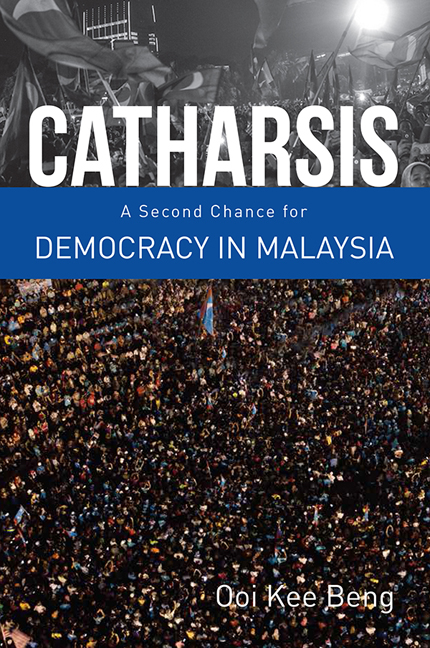Book contents
- Frontmatter
- Contents
- Foreword
- 1 Introduction – Malaysia's Future Is Redeemed
- Before Pakatan Harapan
- Before 9 May 2018
- With Mahathir at the Helm
- Beyond 9 May 2018
- 47 The Bewildering Game of Malaysian Politics, the Rot Within the Barisan Nasional
- 48 A Revolution in Malaysia? Not So Fast…
- 49 Mahathir: Renaissance Man
- 50 Malaysia's Reformasi Movement Lives Up To Its Name
- 51 In Lieu of Race and Religion
- 52 It All Seems So Simple Now…
- 53 Catharsis – The Rebirth of Malaysia Finally Begins
- 54 A Malaysian Spring for Intelligentsia?
- 55 The Layers of Historical Significance of GE14
- About the Author
53 - Catharsis – The Rebirth of Malaysia Finally Begins
from Beyond 9 May 2018
Published online by Cambridge University Press: 12 February 2019
- Frontmatter
- Contents
- Foreword
- 1 Introduction – Malaysia's Future Is Redeemed
- Before Pakatan Harapan
- Before 9 May 2018
- With Mahathir at the Helm
- Beyond 9 May 2018
- 47 The Bewildering Game of Malaysian Politics, the Rot Within the Barisan Nasional
- 48 A Revolution in Malaysia? Not So Fast…
- 49 Mahathir: Renaissance Man
- 50 Malaysia's Reformasi Movement Lives Up To Its Name
- 51 In Lieu of Race and Religion
- 52 It All Seems So Simple Now…
- 53 Catharsis – The Rebirth of Malaysia Finally Begins
- 54 A Malaysian Spring for Intelligentsia?
- 55 The Layers of Historical Significance of GE14
- About the Author
Summary
Maybe it was because the transition took so long and opposition parties had had a chance to rule certain states for two terms and made a change in government an acceptable event. Maybe it was because the fear that Malaysians have a hidden tendency for violent rioting is simply a bad myth kept alive by the federal government that concentrated power unto itself following the 1969 racial killings. Maybe it was because Najib Razak's administration had brought profound shame unto his countrymen. Maybe Malaysians had matured on the sly more than even they themselves had realised. Or maybe it was because the battering ram that finally brought down the defences of the Barisan Nasional (BN), had Mahathir Mohamad, the man who led BN for 22 years, as its head.
Whatever it was, the fall of the longest-ruling regime in a democratic country in the world came amazingly peacefully. In its fourteenth general elections held on 9 May 2018, the Malaysian opposition coalition, Pakatan Harapan, managed to win 122 (55 per cent) of the country's 222 parliamentary seats. A system of government that had always been accused of being but a sham democracy at worst and a semi-democracy at best suddenly crumbled and the longawaited change in government occurred as smoothly as in any mature democracy.
But we know nevertheless that a revolution has just taken place. All comfort zones are being swept away, barely noticed because it is happening in slow motion. If in no other field, the year 2020 when Malaysia is supposed to become an advanced country, appears to have come early where democracy is concerned!
Pundits have often said of the general elections of 8 March 2008 that it was a lucky thing for the country that the BN did not lose power unexpectedly and overnight. Instead, it lost control over five states and the two-thirds parliamentary majority, and therefore no rioting took place because not all was lost to BN and regaining lost support was considered totally possible. After all, Malaysia's electoral results had almost always shown a pattern where one bad election for the BN was followed by a good one.
- Type
- Chapter
- Information
- CatharsisA Second Chance for Democracy in Malaysia, pp. 208 - 214Publisher: ISEAS–Yusof Ishak InstitutePrint publication year: 2018

